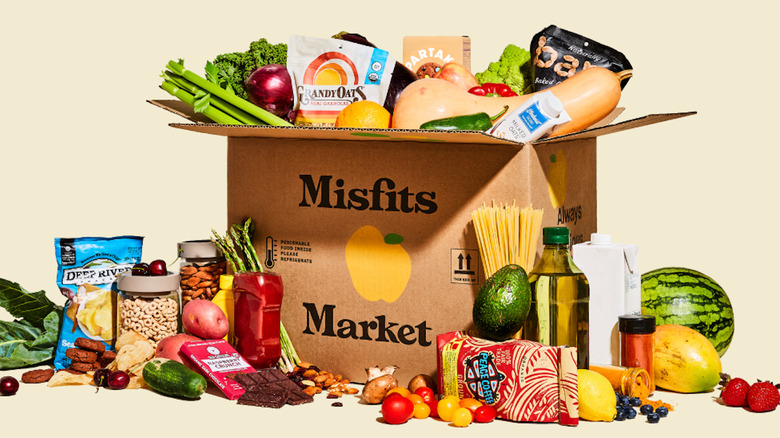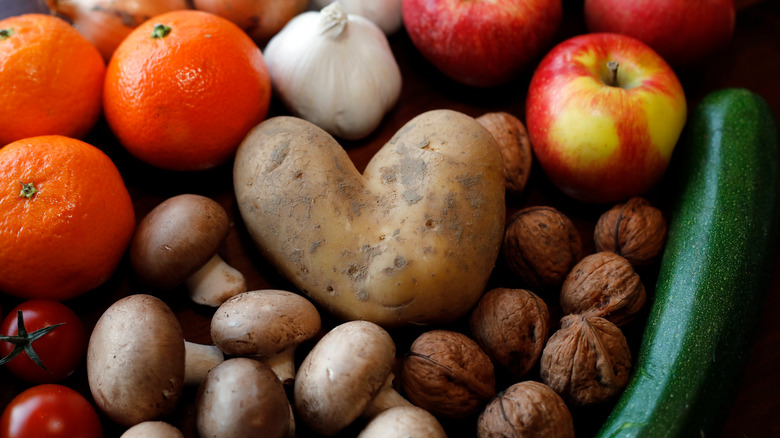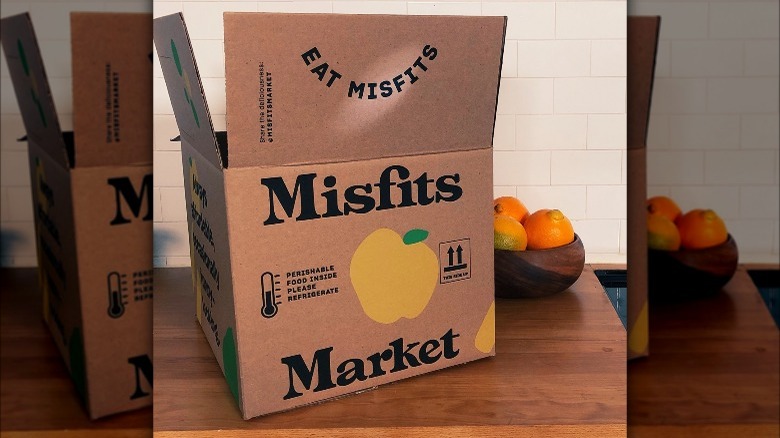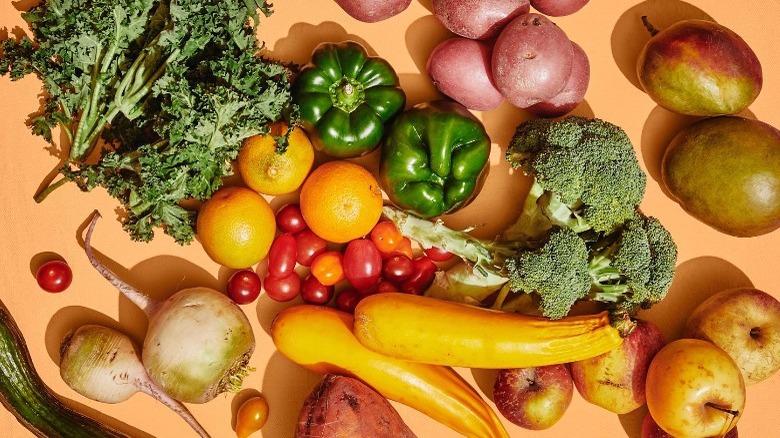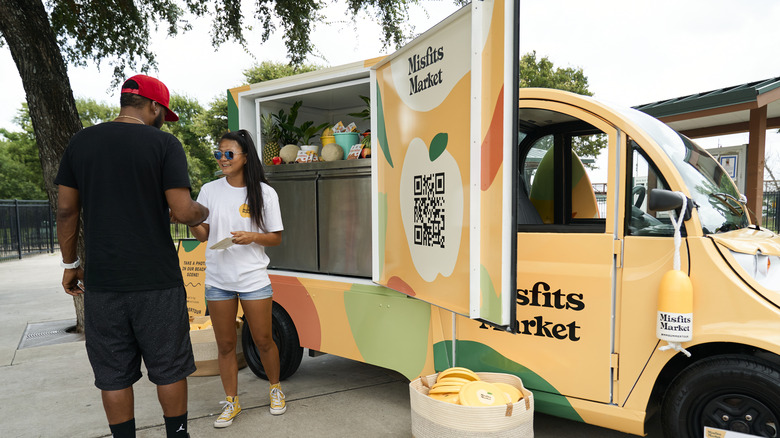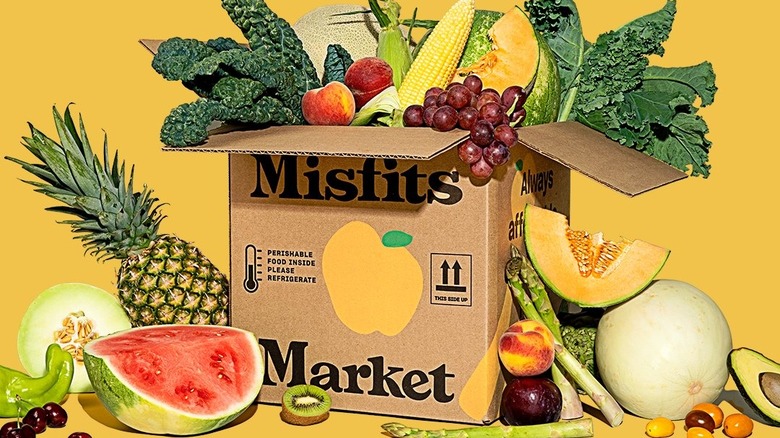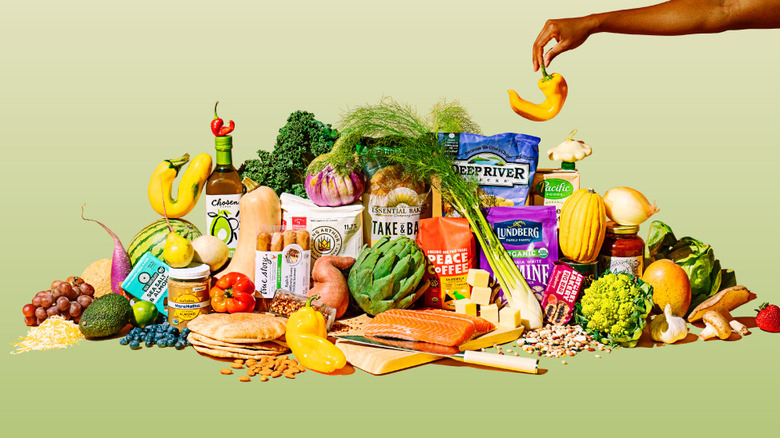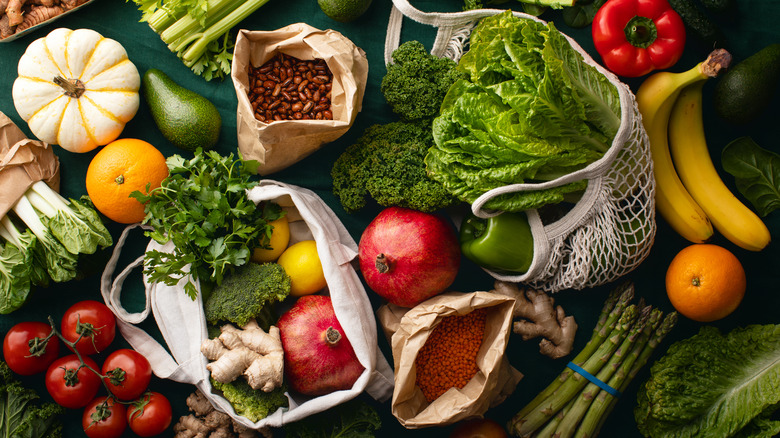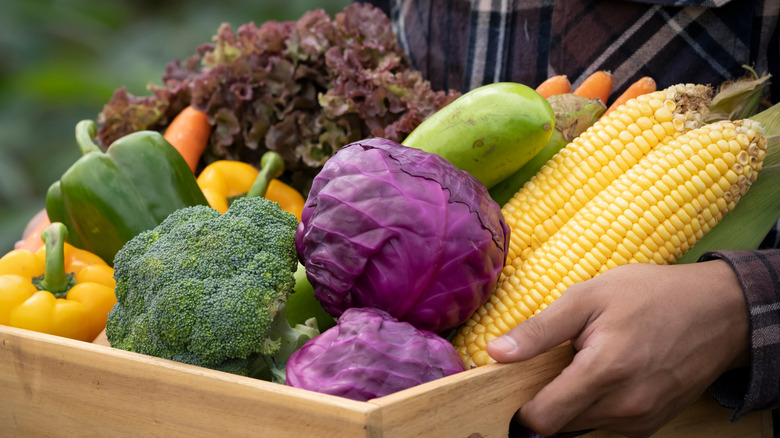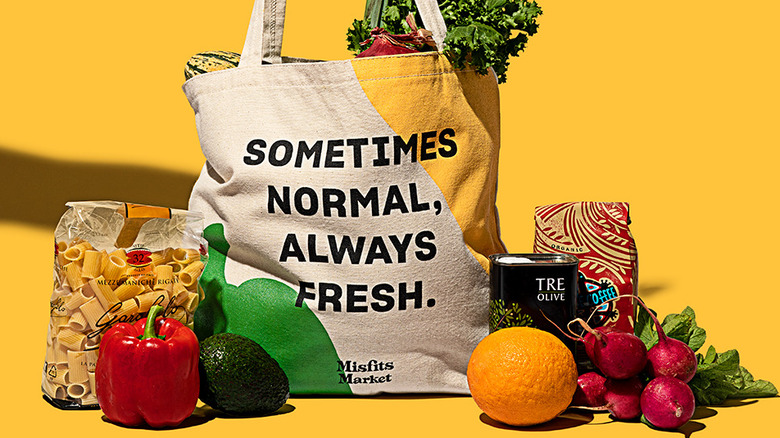The Untold Truth Of Misfits Market
It's no secret that food waste is a serious problem in the U.S. A peek into the dumpster of any restaurant will reveal wilted or moldy produce that went bad before it could be served, not to mention half-eaten entrees left behind by fussy (or full) diners. And home cooks are also part of the problem — who among us hasn't had to toss out half a bag of rotting mesclun? But the issue starts long before our food ever reaches our kitchens. When buying groceries, consumers tend to shop with their eyes, so retail grocers tend to only stock visually attractive produce (per Forbes). As a result, a lot of perfectly edible but homely fruits and vegetables never make to supermarket shelves.
This is where Misfits Market comes in. Founded in 2018, the online grocery store specializes in selling mostly organic produce that standard supermarkets pass over. This allows shoppers access to normally more expensive organic fruits and vegetables at discount prices — all without leaving their homes — and gives less-than-ideal-looking food a place to go, seemingly a win for consumers and for the environment. Here's what you need to know about Misfits Market, its mission, and what to expect when you shop with them.
Misfit produce comes in all shapes and sizes
A guiding principle at Misfits Market is that beauty isn't only skin deep — so when your order arrives, don't expect the shiny, perfectly shaped fruits and vegetables you see in stock photos. Instead, you're likely to get smaller-than-usual and oddly shaped produce. It won't necessarily be ugly — if you've ever shopped at a local farmers' market or grown your own vegetables, you already appreciate wonky-looking but tasty produce. It'll most likely be organic, though some conventionally grown produce is also available, and will be perfectly safe to eat.
But if the idea of eating food that's not up to supermarket standards still gives you pause, it's worth noting that many supermarket standards have nothing to do with cleanliness, nutrition, or food safety. For instance, Consumer Reports notes that some supermarkets only stock bell peppers that have four distinct sides, simply so they can stand upright on a counter. But unless you're using your peppers as centerpieces, paying more for this quality doesn't make sense — a three-sided pepper will taste just fine in your fajitas, and no one will be the wiser.
Misfits Market's founder had no food industry experience
Some successful businesses start when an industry insider identifies an unmet market need and leverages his or her connections and expertise to meet it. And this makes sense — who better to find and address opportunities in banking or real estate or any other industry than someone who knows and understands that industry inside out?
Well, this wasn't the case with Misfits Market, and it still worked out successfully. Instead, its founder, finance professional Abhi Ramesh, got the idea on an apple-picking trip, where he noticed just how many apples — some of which looked perfectly edible to him — were going to waste. He learned that most of these "defective" fruit were to be made into cider or fed to pigs. And while not all the apples were being wasted, Ramesh wondered if there was a way to make more of these edible discards available to consumers. While he had no professional food service experience, Ramesh had researched the trucking industry for an investment fund he worked with and understood how food supply chains contribute to waste (via Pittsburgh Post-Gazette). And with this knowledge and inspiration from his apple-picking trip, he decided do something about it — and started Misfits Market.
The company quickly attracted big investors
At first glance, selling ugly produce at discount prices doesn't sound like a very glamorous business proposition. But Misfits Market's business model resonated with customers seeking to save money while helping prevent food waste, according to Consumer Reports. By 2021 — three years after its founding — Misfits Market was serving 400,000 customers in 37 states (per Forbes). This was a dramatic transformation from the company's early days, when founder Abhi Ramesh bought produce himself from local farmers and shipped it from his apartment.
Shoppers weren't the only ones who eventually started to notice Misfits Market. Investors, recognizing the company's popularity and potential, also took interest and saw even further opportunity for growth. In 2021 alone, Misfits Market attracted $200 million in Series C funding in April, and another $225 million in funding in September. This money — and buzz — resulted in the company nearly doubling in value to roughly $2 billion in just a few short months (per Grocery Dive).
Misfits Market has competitors with similar missions
Misfits Market isn't the only company trying to address the food waste problem by selling overlooked foodstuffs. Even conventional supermarket chains such as Whole Foods have tried – for a while – to offer less-than-perfect-looking produce while educating shoppers about its value, according to Consumer Reports. Unfortunately, their decades of conditioning consumers to expect shiny, uniformly shaped fruits and vegetables worked too well, and most chains soon abandoned these efforts after consumers failed to take interest. Instead of selling oddball produce directly to customers, Whole Foods decided to upcycle it instead for use in its prepared food stations.
But several other online retailers, some with national reach and some that operate regionally, have also emerged with similar business models and missions as Misfits Market. Among the larger competitors is California-based Imperfect Foods, which actually predates Misfits Market; Imperfect Foods was founded in 2015, Misfits Market in 2018. Smaller competitors include Hungry Harvest and Perfectly Imperfect Produce. So if you're looking for affordable ways to get more fresh produce in your diet, you have multiple options.
Misfits Market's role in reducing food waste is complicated
Misfits Market was founded specifically to help reduce food waste. And so far, the company is confident that it's succeeding in its mission. In its 2021 year-end report, Misfits Market reported that it had rescued 228,531,504 pounds of food since its founding, with over 128 million pounds of this being rescued in 2021. According to the report, this represents hundreds of millions of pounds of food that may have gone to waste instead of feeding its satisfied customers.
Some food scientists, however, aren't so sure Misfits Market is really making much of a difference. In an interview with Vox, crop scientist Sarah Taber, who regularly works with farms and agricultural businesses, points out that just because produce doesn't make it to supermarket shelves doesn't mean it's wasted. "They say that a lot of the ugly produce goes to waste," Taber told Vox. "But there's a huge part of that produce that goes to food service, where it gets cut up and appearance doesn't matter." In addition, she said that rotting produce plowed back into the ground serves to fertilize future crops, and surplus produce fed to animals indirectly replenishes the human food supply. "Melons, for example, have no soft market, so they are fed to cattle and pigs," she said. "But then you have people going, 'Oh, my god, it's wasted!' But somebody ate it. So is that really waste? No."
You no longer need a subscription at Misfits Market
Misfits Market has undergone a lot of growth and change since its 2018 beginnings as a one-man operation run out of its founder's apartment. Today, it offers deliveries to all 48 states in the continental U.S. and serves over 400,000 customers (via Food On Demand).
As the company has grown its business model has shifted in large part due to customer demand. Initially, Misfits Market adopted a model akin to a CSA subscription — subscribers could order large or small boxes of produce and would receive an assortment of whatever was available and in season, according to the Pittsburgh Post-Gazette. Non-subscribers could order boxes too for a slightly higher price. That's no longer the case. It stands to reason, however, that customers preferred having more control over their choice of groceries, and some were throwing out surprise items they didn't like or know how to prepare — thus compounding the very food waste problem Misfits Market was trying to solve. So today, shopping at Misfits Market is pretty much like online ordering at a conventional grocery store. While you need to sign up for a free account, there's no subscription fee and you can choose the items you want (they start your list with a few suggested items, which you can keep or discard).
You can save money on organic produce
It's pretty likely that nobody would go out of their way to buy and eat ugly produce without some sort of incentive. And shoppers at Misfits Market have two incentives: the satisfaction of enjoying sustainably sourced food that may have otherwise gone to waste, and access to organic produce at significantly reduced prices. According to Misfits Market's homepage, shopping with them lets you enjoy organic produce and groceries for 40% less than standard supermarkets.
But are such big savings typical? In January 2022, Maura White at Happy Deal Happy Day paid $23.35 for her first box. This price included the shipping fee and the 25% discount for new customers. Then she priced out the same items at her local supermarket, Wegman's. The total at Wegman's came to $32.77 — so even without the first-time discount, she would have still saved $5. The YouTube channel "The Long Run with Joel and Christy" attempted a three-way direct comparison among Misfits Market, Aldi, and Walmart. They found that while neither Aldi nor Walmart offered all the same items as Misfits Market, in most cases when a direct price comparison was possible, Misfits Market was less expensive. Both reviewers noted that Mischief Market's low prices are somewhat offset by their shipping fee (a flat fee by zip code that starts at $6.99 per box). But if the convenience of home delivery matters to you, this could be well worth it.
You can get much more than produce at Misfits Market
Another way in which Misfits Market has evolved is in its inventory. While misfit organic produce is still the cornerstone of its products and marketing, the company has expanded its offerings to include meat, seafood, dairy, and other items like pet food and household and pantry items. While not all of these items are organic, all reflect the company's focus on sustainability in some way — chicken is free range and GMO free, seafood is sustainably harvested, and beef is grass-fed. Not to mention, the company strives to procure its meat from farms that practice humane livestock management.
While most cuts of meat and seafood you'll find at Misfits Markets are the same conventional cuts you'll see elsewhere, depending on availability, you may have the opportunity to sample meat misfits, too. Don't worry, these won't come from three-eyed fish or two-headed cattle — they'll just be irregularly shaped cuts of the same high-quality meat as their other offerings — for instance, salmon tails or irregular chicken breasts. So if you're looking to save extra money without skimping on quality, keep an eye open for these opportunities.
It might not be your best bet for local produce
Sustainability-minded shoppers have flocked to Misfits Market because they believe it allows them to eat well by doing good. And the company's rapid growth — the company now delivers in 48 states and literally doubled in valuation in 2021 alone, according to Grocery Dive – confirms that Misfits Market's mission of rescuing overlooked foodstuffs resonates with a significant number of consumers. Furthermore, customers appreciate that Misfits Market takes sustainability seriously, packing their deliveries in mostly compostable materials.
But besides sustainability, a big reason many consumers seek out organic produce is flavor and freshness — which is also why many patronize local farmers' markets or CSAs, where they know the produce they'll be buying will be locally grown and thus fresh. Many of the farms from which Misfits Market procures its produce also participate in CSAs — but freshness can be a gamble if your food spends several days being shipped cross country. While a review in Healthline found their produce arrived in "immaculate condition," others found their deliveries a little worse for wear. As a reviewer in Eat, Drink, and Save Money observed, "Produce that is shipped across the country spends its prime being relocated." And Happy Deal Happy Day noted that "It for sure spoils faster than if I were to buy fresh produce from my store that day." These problems aren't unique to Misfits Market – but are worth thinking about if you're considering any grocery delivery service.
Produce selections vary by season
While you can depend on Misfits Market to offer a wide variety of produce, including less-common vegetables such as fennel and maitake mushrooms, don't expect to see the exact same assortment every time you shop. This is because Misfits Market sells what its partnering farms can provide, and these offerings will vary by the season. For example, fall and winter selections can include cold-weather vegetables such as winter squash, cabbage, and kale, while other seasons may bring harder-to-find items such as white asparagus and garlic scapes.
This focus on seasonality is also consistent with Misfits Market's goal of offering organic food at affordable prices. As noted by mindbodygreen, seasonal produce is not only fresher and more sustainable, it's also less expensive. For instance, strawberries grow more easily in North America in summer months, so they are more abundant then and thus cheaper. And not having to ship them long distances from warmer climates means more savings — as well as less of a burden on the environment.
Flexibility is key to get the most from Misfits Market
Over the years, Misfits Market has adjusted its business model to allow shoppers more choice and flexibility in what they buy (per Consumer Reports), after realizing customers found their original mystery box subscription — in which all customers got the same box of whatever was in season — limiting and unpredictable. So today, shoppers can log on to their online marketplace and choose whatever items they please.
But while Misfits Market has increased its offerings in recent years, you shouldn't expect the same experience you'd get from a standard grocery store. Fruits and vegetables may be different sizes or shapes than you might be used to, and because of the emphasis on seasonal produce, an item you enjoyed last week might not be available this week. Furthermore, some popular specialty or seasonal items are in limited supply and can sell out fast — so we recommend adding these to your cart as soon as you log in and start to shop. It also helps if you're nimble enough in the kitchen to tweak your menus to accommodate what's on offer.
